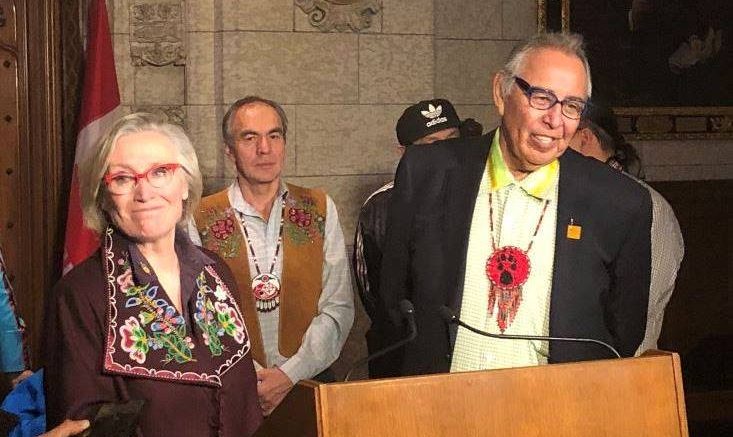December 6, 2018 – On December 6, 2018, Carolyn Bennett, Minister of Crown-Indigenous Relations, along with Garry McLean, Claudette Commanda, Mariette Buckshot and Roger Augustine, announced that an Agreement-in-Principle has been reached in the Indian Day Schools (McLean) class action.
The signing of the Agreement-in-Principle marks an important milestone for thousands of Indigenous people who suffered cultural harm and physical and sexual abuse while attending federally operated Indian Day Schools.
The Agreement-in-Principle combines individual compensation for harms associated with attendance at an Indian Day School with a forward-looking investment to support healing, wellness, education, language, culture and commemoration for class members and their communities.
Over the past several months, the Government of Canada and counsel for the plaintiffs have been engaged in negotiations to resolve this litigation in a fair, compassionate, and respectful manner that promotes reconciliation and healing.
“The mistreatment of Indigenous children is a shameful part of Canada’s history,” noted Minister of Crown-Indigenous Relations Carolyn Bennett. “This Agreement-in-Principle brings us one step closer to bringing lasting and meaningful resolution and healing to the legacy of Indian Day Schools. Canada is committed to reconciliation and laying the foundation for multi-generational healing and will continue to work with survivors toward righting historical wrongs.”
Canada will continue to work with survivors and Indigenous partners to advance reconciliation, promote Indigenous languages and culture, and support the healing and commemoration of those affected by the harmful policies of the past.
“Ever since 2006, when the Indian Residential Schools claim was settled, we have been struggling for recognition of the harms suffered by Indian Day School students, who were not part of the settlement,” stated lead plaintiff Garry McLean. “We are relieved that we have reached this milestone. This settlement will benefit all students who attended these federally operated day schools and their families and communities.”
Quick facts
- Beginning in the 1920s, close to 200,000 Indigenous children attended federally operated Indian Day Schools. Many students who attended these schools experienced trauma associated with cultural harms, and in some cases, physical and sexual abuse at the hands of individuals entrusted with their care.
- Indian Day Schools were operated separately from the Indian Residential Schools system and were not included in the Indian Residential Schools Settlement Agreement. Unlike residential schools, which removed children from their families and communities, federally operated day schools did not board students overnight.
- Parties are working to finalize the settlement agreement, and will seek court approval through a fairness hearing targeted for late Spring 2019.
- Key elements of the Agreement-in-Principle include: individual compensation for harms associated with attendance at an Indian Day School; a $200 million investment to support healing, wellness, education, language, culture and commemoration; and funding for legal fees.




nobody wins, but atleast moneys much needed will start comming thru
think about it for a minute does it really say.?